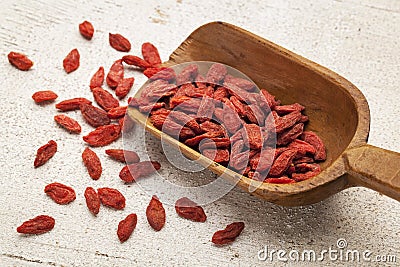Extracted from “The Star – 13th August 2013”
Goji berry or wolfberry, also known as Lycium barbarum, is a bright orange-red berry with a mild tangy taste. It is an ancient fruit found growing wild in the Himalayan regions of Asia which has been recognised by traditional herbalists as a tonic for liver and kidney functions as well as liver detoxification.

In traditional Chinese medicine, goji berries are used to cure a variety of ailments. According to Emperor Shen Nung (475-221 BC), in an early written documentation of traditional Chinese medicine, goji berries offer a wide array of nutritional values ranging from building up health to strengthening and restoring the body’s major organs.
They are packed with antioxidants, amino acids and other health-promoting vitamins and minerals. These berries can be eaten raw, brewed into tea, added to soup and stew, or made into liquid extracts.
Goji berries are thought to be one of the most nutritionally dense food. They contain:
>500 times more vitamin C in weight than oranges
>15 times more iron than the amount found in spinach
>More beta-carotene than in carrots
>18 types of amino acids which are six times higher than in the pollen
>21 trace minerals, the main ones being zinc, iron, copper, germanium and selenium.

Benefits of Goji Berries
The Goji berry is regarded as the “longetivity fruit”. It contains unique polysaccharides with immune-enhancing properties. These polysaccharides work to fortify the body’s immune system and increase the body’s resistance against diseases and infections.
The berries are also rich in vitamin C and zinc, both of which are known to boost the immune system.
Goji berries contain key nutrients that support healthy visual functions. They are rich in carotenoids such as beta-carotene and zeaxanthin. Research findings indicate that zeaxanthin helps protect our retina against oxidative stress and prevent the onset of eye diseases such as age-related macular degeneration (AMD), cataract, glaucoma and diabetic retinopathy.

The impressive amount of antioxidants found in goji berries helps protect the body from free radical-damaging effects, delay ageing and manage are-related complications. Several studies on goji berry suggest that it can support brain health and may protect against age-related diseases such as Alzheimer’s.
Besides that, goji berries give you a splash of energy and vitality, and a clean feeling from the inside out. They effectively help the body to eliminate fatigue and relieve headaches, especially when recovering from illnesses. It also helps to improve the quality of sleep, wellbeing and even increase libido in both men and women.
Moreover, goji berries are also a rich source of selenium and germanium. Both are known to have anti-cancer properties. In addition, the contents, polysaccharides and antioxidants, provide extra protection against free radicals. Hence, goji berries are known to lessen the chance of developing certain types of cancers.
Goji berries can be taken raw or cooked. In Chinese cuisine, they are often added to soup and stew. Other than eating the berries, you can find juices or tea made from goji berries. You can also opt to take goji berry extracts as a dietary supplement.

